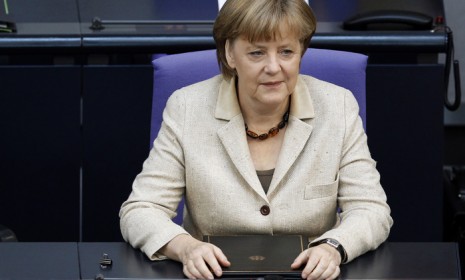Will Germany cave in to the demands of Greece's anti-austerity parties?
The two countries are butting heads over Greece's refusal to comply with the terms of its financial bailout, and it's unclear which side will blink first

In the aftermath of watershed elections this month, Greece's splintered political system is struggling to form a ruling coalition. The main obstacle is Syriza, a fringe party that rode to an unprecedented, second-place finish on a wave of popular anger against the government's harsh austerity programs, which have plunged Greece into its fifth year of a devastating recession. The European Union and the IMF had demanded that Greece put austerity measures in place in exchange for hundreds of billions of dollars in bailout funds. Syriza's leader, Alexis Tsipras, says that the bailout terms are a form of "financial barbarism," and that Greece will not abide by them. Germany, the EU's largest economy, is putting down its foot, saying that Greece's lifeline will be cut off if it doesn't follow through. Something has to give if Greece is to remain in the eurozone. Will Germany cave in to Tsipras' demands?
Germany might just wash its hands of Greece: Germany is "exasperated" with Greece, and is "close to concluding that the insolvent country is a lost cause following more than two years of a roller-coaster debt crisis," says Ian Traynor at Britain's The Guardian. High-level German officials for the first time are even speaking "publicly of the possibility of the Balkan country having to quit the eurozone." Tsipras' "inflammatory comments" are not helping to bridge the gap, and "patience in Europe is running out."
"Berlin and Athens locked in a war of nerves over bailout"
The Week
Escape your echo chamber. Get the facts behind the news, plus analysis from multiple perspectives.

Sign up for The Week's Free Newsletters
From our morning news briefing to a weekly Good News Newsletter, get the best of The Week delivered directly to your inbox.
From our morning news briefing to a weekly Good News Newsletter, get the best of The Week delivered directly to your inbox.
Actually, Germany will buckle in the end: Even if Greece can form a government, "it won't have a mandate to stick with the current austerity program," says Bloomberg in an editorial. Letting Greece exit the eurozone "would be a reckless gamble" with possibly ruinous economic consequences, and Germany mustn't let that happen. Germany should give the Greeks more time to turn their finances around, and take bolder steps to back the finances of weaker members of the eurozone. "If Germany refuses to bend, then it will, fairly or not, be held responsible for whatever happens next."
"Greek elections force Germany to weigh austerity endgame"
Either way, the moment of truth is fast approaching: The decisive moment "will come when Greece has to pay some bondholders on May 17 and when the government will effectively run out of money to pay salaries, bills, and benefits come July," says Marcus Mabry at The International Herald Tribune. At that point, Greece could fold once it sees what it's up against, or "the Europeans could agree to renegotiate the bailout rather than risk the unraveling of the euro bloc."
"Time for Greece and the euro to part ways?"
A free daily email with the biggest news stories of the day – and the best features from TheWeek.com
-
 Political cartoons for January 24
Political cartoons for January 24Cartoons Saturday's political cartoons include 3D chess, political distractions, and more
-
 Ryanair/SpaceX: could Musk really buy the airline?
Ryanair/SpaceX: could Musk really buy the airline?Talking Point Irish budget carrier has become embroiled in unlikely feud with the world’s wealthiest man
-
 Claudette Colvin: teenage activist who paved the way for Rosa Parks
Claudette Colvin: teenage activist who paved the way for Rosa ParksIn The Spotlight Inspired by the example of 19th century abolitionists, 15-year-old Colvin refused to give up her seat on an Alabama bus